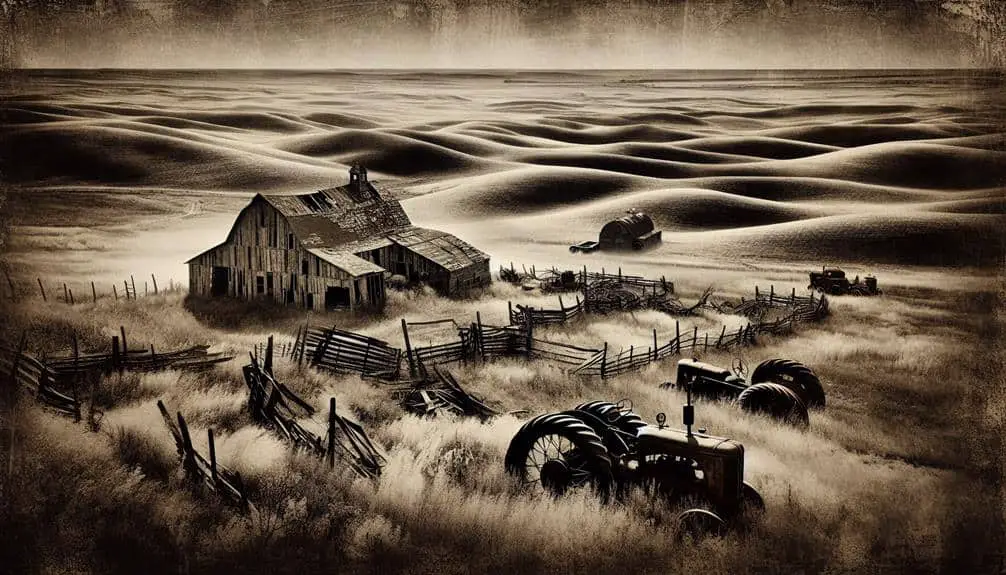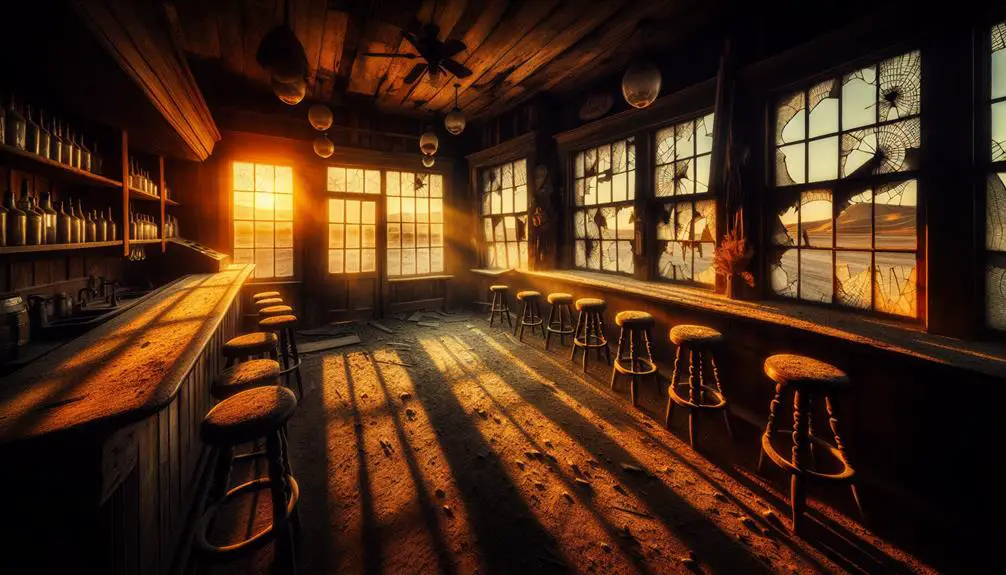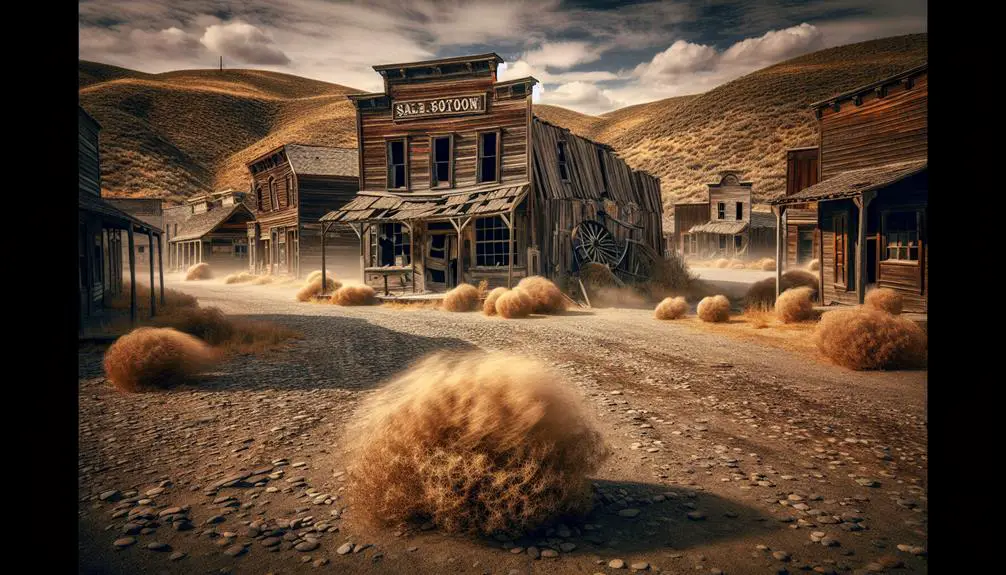The rustic relics of the American West are significant due to their role in preserving the region's rich history. These relics, such as ghost towns, highlight the boom-and-bust cycles, economic development, and cultural tapestry of early settlers. They offer insights into past lifestyles, showcasing resilience and ingenuity. By safeguarding these relics, we honor the legacy of the American West and provide hands-on learning opportunities. Exploring these sites connects you to the pioneering spirit and values of the frontier. Their significance goes beyond mere artifacts, delving into the essence of the region's vibrant past and diverse heritage.
Key Points
- Rustic relics preserve the history and heritage of the American West.
- They offer insights into the lives of early settlers and indigenous peoples.
- Symbolize the enduring legacy of resilience and fortitude on the frontier.
- Reflect the diverse cultural tapestry and pioneering spirit of the region.
- Uphold the values of self-reliance, individualism, and manifest destiny.
Historical Significance of Ghost Towns
Ghost towns in the American West hold a profound historical significance, providing a glimpse into the past economic, social, and cultural dynamics of the region. These abandoned settlements, once vibrant hubs of economic activity, now stand as poignant reminders of the boom-and-bust cycles that shaped the Western frontier. The rise and fall of these towns mirror the ebbs and flows of economic development in the American West, showcasing the transient nature of prosperity in a land defined by resource extraction and migration.
Community engagement was integral to the growth of these ghost towns, as settlers banded together to establish thriving economies based on mining, agriculture, or other industries. The remnants of old saloons, general stores, and schools bear witness to the collective efforts of individuals who sought to build a better life in the harsh yet promising landscape of the West. Exploring these abandoned spaces fosters a deep appreciation for the resilience and ingenuity of those who once called these ghost towns home.
Preservation of Western Heritage
Preserving the rich heritage of the American West involves safeguarding the tangible remnants and intangible legacies of its past inhabitants. Cultural preservation plays an important role in maintaining the authenticity and identity of the Western heritage. It encompasses the protection of historical sites, artifacts, traditions, languages, and customs that have shaped the region's unique character over time.
Heritage conservation is essential for ensuring that future generations have the opportunity to connect with the roots of the American West. By safeguarding historical buildings, landmarks, and archaeological sites, we can provide insights into the lifestyles, beliefs, and struggles of the people who once inhabited these areas. Preserving intangible aspects such as oral histories, folklore, music, and art forms contributes to a deeper understanding of Western heritage.
Through a concerted effort to uphold cultural preservation and heritage conservation, we can honor the legacy of the American West and maintain a sense of continuity with the past. By valuing and protecting these treasures, we uphold the spirit of freedom and diversity that defines the Western experience.
Tourism and Economic Impact
The influx of tourists drawn to the rich heritage and cultural treasures of the American West greatly impacts the region's economy, fostering growth and sustainability through visitor spending and heritage-related industries. Tourism revenue plays a significant role in the economic landscape of the American West, injecting funds into local businesses, accommodations, and attractions. This financial influx not only supports the preservation of rustic relics but also contributes to the overall economic prosperity of the region.
Moreover, the tourism industry creates a multitude of local employment opportunities, ranging from hospitality and tourism services to retail and transportation sectors. Job creation in these fields helps stimulate economic development in rural areas and small communities, providing residents with stable sources of income. Additionally, heritage-related industries such as historical tours, museums, and cultural events further enhance the appeal of the American West to visitors, thereby boosting tourism revenue and sustaining economic growth in the region. The symbiotic relationship between tourism and the economy underscores the significance of preserving and promoting the rustic relics of the American West.
Cultural and Educational Value
Exploring the cultural and educational value of rustic relics in the American West reveals a deep connection to the region's history and identity. These relics play an important role in cultural preservation and offer visitors an enriching educational experience. Here are four key aspects highlighting the significance of these relics:
- Historical Significance: Rustic relics serve as tangible reminders of the past, offering insights into the lives of early settlers and indigenous peoples. They provide a window into the challenges and triumphs that shaped the American West.
- Cultural Preservation: By conserving these relics, communities safeguard that future generations can connect with their heritage and understand the traditions and values that have defined the region.
- Educational Experience: Visiting rustic relics offers a hands-on learning opportunity, allowing visitors to engage with history in a tangible way. This experiential learning enhances understanding and appreciation for the American West's cultural landscape.
- Identity and Heritage: Rustic relics are integral to the identity of the American West, reflecting the pioneering spirit and resilience of those who shaped the region. They serve as a reminder of the diverse cultural tapestry that makes the West unique.
Symbolism of the American Frontier
Symbolizing the essence of pioneering spirit and resilience, rustic relics in the American West encapsulate the frontier's enduring legacy. The American frontier represents more than just a physical boundary; it embodies a set of ideals and values that have shaped the nation's identity. The concept of manifest destiny, the belief that the United States was destined to expand across the continent, is intricately tied to the symbolism of the American frontier. Rustic relics serve as tangible reminders of this historical imperative, reflecting the unwavering determination and ambition of early settlers to conquer the vast unknown.
The frontier spirit, characterized by self-reliance, individualism, and a pioneering mindset, is deeply ingrained in American culture. Rustic relics such as log cabins, covered wagons, and pioneer tools evoke this spirit, reminding us of the challenges faced and overcome by those who ventured into the unknown. By preserving these relics, we honor the legacy of resilience and fortitude that define the American frontier, ensuring that its symbolism endures for future generations.
Frequently Asked Questions
How Do Ghost Towns Contribute to the Overall Narrative of the American West's History?
When exploring the American West's history, ghost towns play a pivotal role. Their historical preservation offers insights into the past, while attracting tourists, contributing to the economy. These relics hold cultural significance, enriching the narrative of the region.
What Specific Measures Are Being Taken to Preserve the Authenticity and Integrity of Western Heritage Sites?
Preservation efforts for western heritage sites include strict guidelines to maintain historical authenticity. Proactive measures such as regular inspections, restoration projects, and community involvement guarantee the integrity of these rustic relics for future generations to appreciate.
How Do Ghost Towns Attract Tourists and Contribute to the Local Economy?
As you explore the allure of ghost towns, the fusion of history and mystery captivates tourists. Economic impact is profound; these relics attract visitors, infusing local economies with vibrancy while preserving heritage through sustainable tourism.
In What Ways Do Ghost Towns Educate Visitors About the Cultural Diversity and Richness of the American West?
When you explore ghost towns, you initiate a cultural exploration of the American West. By encountering the historical significance, educational value, and architectural preservation of these sites, you gain a deeper understanding of the region's diversity and richness.
How Do the Relics of the American Frontier in Ghost Towns Symbolize the Resilience and Pioneering Spirit of Early Settlers?
As you explore ghost towns, the relics strewn about stand like sturdy sentinels, echoing the resilience of pioneers who faced untamed frontiers with unwavering determination. Each artifact whispers tales of grit and fortitude.



